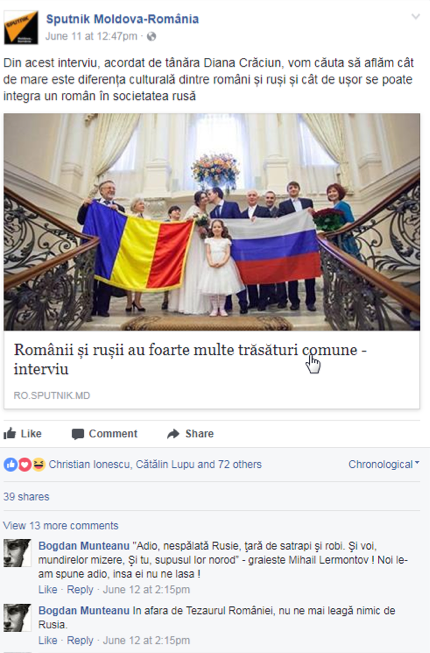
By Corina Rebegea, for CEPA
Classic Russian propaganda stories are a rare occurrence in Romania’s media space. Yet discreet attempts to win over the hearts and minds of Romanians are becoming more common. Sputnik recently posted an interview with a Romanian woman married to a Russian man and living in St. Petersburg who painted a rosy picture of life there. The interview is a real treat for its carefully selected words and praises of Russian culture, lifestyle and openness to foreigners in an obvious attempt to portray Russia as a sort of promised land. It is also unique because typically pro-Kremlin media outlets publish articles and commentaries criticizing the West and pointing to its decay and corruptive nature.
The interview received little social media attention—with 128 Facebook interactions including likes, comments and shares, and just over 900 views on the webpage—though it was much more popular than typical Sputnik news articles, which have very little following. But the reach is less important than the role these positive stories play in creating a balance between love and fear that makes Russia such a formidable information war machine. Romanians have a deeply rooted fear of Russian aggression that pro-Kremlin media trying to assert Russia’s military superiority over NATO—and thus Romania’s vulnerability—can easily exploit. However, it still must construct the love component. Russian propaganda is slowly trying to break through the collective dislike of Russia with narratives about the benefits of strengthening Romanian-Russian economic ties, and also through endearing snippets about life in Russia and personal accounts that connect with the reader at a more intimate level.


Instilling doubt about Romania’s NATO and EU choices or weakening pro-Western sentiment is potentially more lucrative for the Kremlin than trying to boost Russia’s approval rating among Romanians, who have no nostalgia for the USSR and perceive Russia as a historical enemy and a threat. It will take more than a few media campaigns to reverse those perceptions. On the other hand, playing the anti-West card fits better with conspiracy theorists and nationalists who already populate various corners of the internet.
But the love-fear continuum is an overarching element of online Russian propaganda everywhere and Moscow serves it in regular installments on various media. Articles like Sputnik’s interview form only one piece of the #SlavaPutin (glory to Putin) puzzle that pro-Kremlin trolls and their unsuspecting followers build every day on Facebook. In their world, pictures, anecdotes, memes and personal testimonies paint an appealing picture of Russia’s greatness. Facebook is a solid breeding ground for Putin’s adorers. His personality cult—along with news about Russia’s military might or sensible fair foreign policy decisions—aims to obliterate real news about Russia. With pro-Putin propaganda having carved a space on its own in international media, Romania’s pro-Kremlin trolls have a daily mission to share these narratives and slowly drill them into their followers’ minds.

Such social media behavior, including the replaying of older narratives (trolls often republish forgotten stories from months or years ago), is also part of a Russian propaganda water drop technique by which snippets of (dis)information either pro-Kremlin or anti-West are dripped into the media space every day with the deliberate aim to erode confidence and attachment to Western values and institutions. This is enough to suggest there is increased experimentation in how Kremlin propaganda targets Romanians and we need to pay attention to whether the efforts to edulcorate their view of Russia will continue and succeed.





